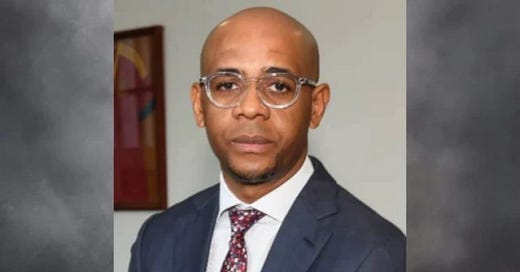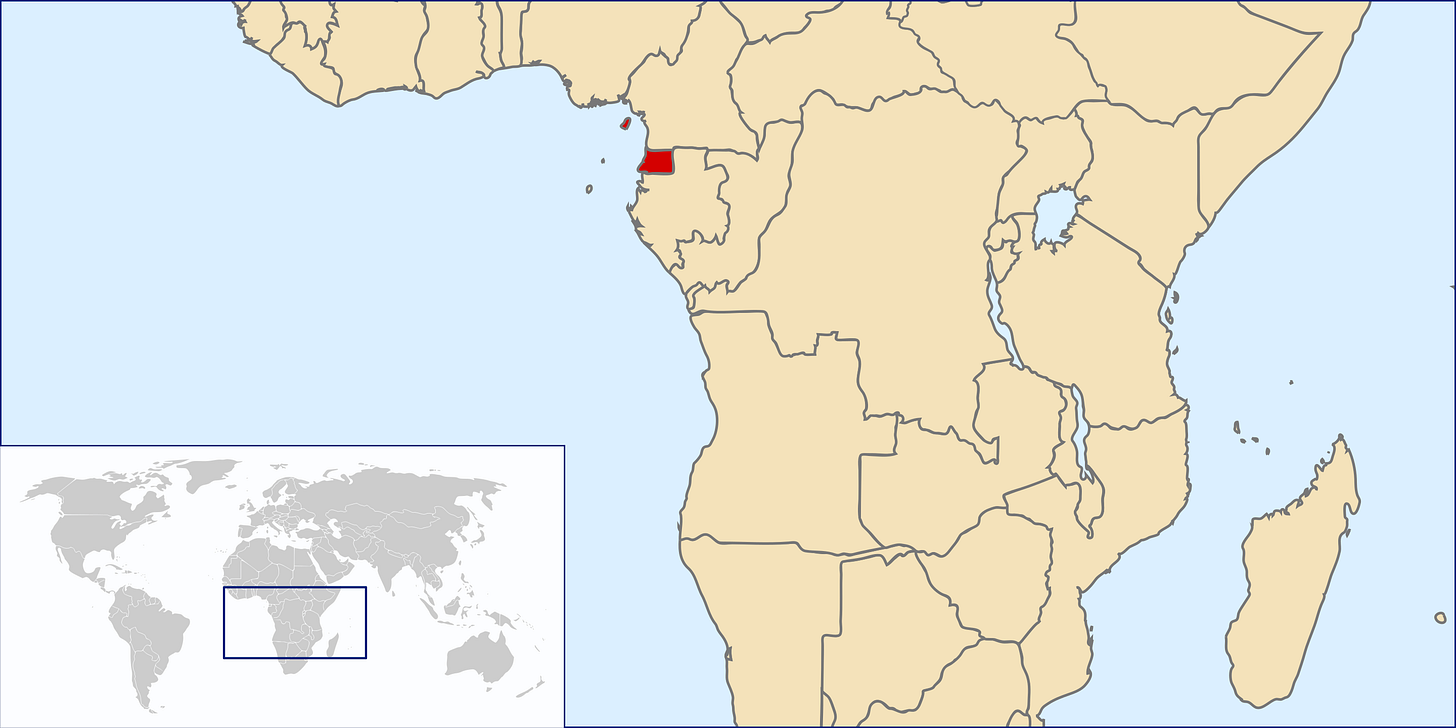🔅 Sex, Lies, Videotapes, and a Battle for the Throne: Equatorial Guinea's Scandal
Diamonds Aren't Forever in Botswana & Africa's Asthma Crisis
Image of the Day
Good Morning from The Gambia

Spotlight Stories
Sex, Lies, and Videotapes: The Equatorial Guinea Scandal and the Battle for the Throne
In the world of Equatorial Guinean politics, where palace intrigue reigns supreme, a new scandal has erupted that's got everyone talking. Over the past few weeks, the small central African country has been rocked by the leak of dozens (or possibly hundreds) of sex tapes featuring a high-ranking government official, Baltasar Ebang Engonga, getting intimate with various women, including the wives and relatives of people close to the center of power.
But this isn't just your average political sex scandal.
There might be a lot more bubbling beneath the surface, and it all ties back to the question of who will succeed President Teodoro Obiang Nguema, the world's longest-serving president who's been in power since 1979.
Baltasar Ebang Engonga, a.k.a. "Bello," isn't just any government official. He's the nephew of President Obiang and one of the contenders rumored to be vying for the top job when his uncle eventually steps down (or is pushed out).
But Engonga isn't the only one with his eye on the prize. Enter Vice-President Teodoro Obiang Mangue, the president's son and the owner of a $275,000 crystal-encrusted Michael Jackson glove (yes, really). Many believe that the vice-president is on a mission to clear the path for his own presidential ambitions by taking down anyone who poses a threat – including his own half-brother, Gabriel Obiang Lima, who was recently moved from his powerful position as oil minister to a secondary government role, and Baltasar Engonga.
Indeed, just before the sex tapes leaked, Engonga was arrested on suspicion of embezzling a huge sum of money from state coffers and stashing it away in secret Cayman Islands accounts. His phones and computers were seized, and lo and behold, the intimate videos started appearing online soon after.
Coincidence? Many think not.
The timing of the leaks has led to speculation that this could be a calculated move by someone in power to discredit Engonga and eliminate him as a potential successor to the presidency.
So, while the international community may be fixated on the salacious details of the scandal, those fighting for change in Equatorial Guinea are urging us to look beyond the headlines and focus on the deeper issues at play.
As the sex tape scandal continues to unfold, the question on everyone's mind is: who will emerge victorious in the battle for the presidency?
Will Engonga, currently detained in the infamous Black Beach prison, be able to weather the storm and continue his bid for power? Will the vice-president succeed in eliminating his rivals and securing his place as the next leader? Or will the leaks be traced back to a political rival, sparking even more chaos and intrigue?
Diamonds Aren't Forever: Botswana’s Rocky Relationship with De Beers

Botswana's new president, Duma Boko, has a sparkly problem on his hands: repairing the relationship with Anglo American's De Beers diamond business. You know, the company that's been mining diamonds in Botswana since before most of us were born.
Boko's party, the Umbrella for Democratic Change, defeated the Botswana Democratic Party (BDP), which had been in power since 1966. That's the year after De Beers discovered diamonds in Botswana, and the two have been in a long-term relationship ever since.
But like any long-term relationship, things have gotten a bit rocky lately. Boko's predecessor, Mokgweetsi Masisi, drove a hard bargain with De Beers before the elections, accusing the company of "short-changing" Botswana and "leaving us in poverty [while] they get rich." Ouch.
Masisi negotiated a new 10-year sales contract that allows Botswana to keep up to half of Debswana's (the joint venture between Botswana and De Beers) output to sell for itself, up from a quarter at present.
But the perception of how Masisi handled these talks may have, in part, contributed to his election loss. Some voters feared his confrontational approach compromised relations with De Beers and Botswana's economic stability.
Now, Boko is stepping in to smooth things over. He's pledged to hold new talks with De Beers, suggesting he might be willing to negotiate different terms. But he better act fast, because Anglo's chief executive, Duncan Wanblad, wants to offload De Beers by next year. It's like a high-stakes game of hot potato, but with diamonds.
If Anglo does sell or list De Beers, Botswana's government may have to work out how to deal with new majority shareholders or assess whether to increase its own stake.
But despite the recent bumps in the road, Botswana has generally been praised for managing its diamond wealth effectively and to the benefit of its 2.5 million people. The country's GDP per capita is one of the highest in Africa, thanks in large part to diamonds and partners like De Beers. However, deficits have grown more common in recent years, and high youth unemployment and inequality cost Masisi's party at the polls.
Asthma in Africa: The Silent Sufferer of Urbanization

Asthma, the respiratory condition that affects millions worldwide, has found a new breeding ground in Africa. As the continent undergoes rapid urbanization, researchers have discovered that millions of teenagers are suffering from undiagnosed asthma.
The Acacia study (Achieving Control of Asthma in Children and Adolescents in Africa) recruited 27,000 pupils aged between 12 and 14 from urban areas in Malawi, South Africa, Zimbabwe, Uganda, Ghana, and Nigeria. The results were startling:
12% reported asthma symptoms
Only 20% of that group had received a formal diagnosis
Even among those diagnosed, a third were not using any medicine to control their condition
It's a silent epidemic, with millions of teenagers struggling to breathe, missing school, and having their sleep disrupted by wheezing.
So, what's behind this surge in asthma cases?
Experts point to two main factors: rapid urbanization and climate change. As cities expand and populations grow, children are exposed to more risk factors such as air pollution. It's a recipe for respiratory disaster, with tiny particles of pollutants making their way into young lungs and wreaking havoc. And then there's climate change, the wild card in this asthma equation. In some areas of sub-Saharan Africa, climate change could lead to increased exposure to dust and natural fires. On the flip side, climate change mitigation efforts could reduce exposure to fossil fuel-derived particles.
With millions of teenagers suffering from undiagnosed and poorly controlled asthma, the need for action is urgent. But it's not just about handing out inhalers and calling it a day. Innovations such as handheld wheeze detectors and asthma clinics delivered at schools could also play a crucial role in reducing the burden of asthma.
And let's not forget the role of the pharmaceutical industry. Companies have been hesitant to support asthma research and initiatives in countries where they don't intend to market their products. It's time for them to step up and be part of the solution.
Food for Thought
“One head does not consume all knowledge.”
— Kenyan Proverb





